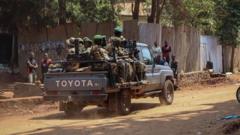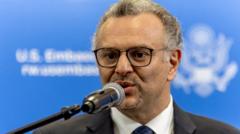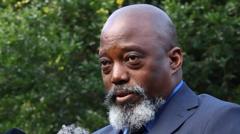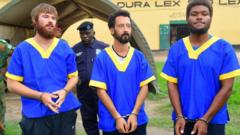Three American citizens, implicated in a failed coup in the Democratic Republic of Congo, have had their death sentences reduced to life imprisonment, marking a significant shift amid ongoing U.S.-Congo diplomatic dynamics.
Three Americans See Death Sentences Commuted in Congo Coup Case

Three Americans See Death Sentences Commuted in Congo Coup Case
American citizens' sentences reduced to life imprisonment amidst diplomatic efforts in central Africa.
In a recent announcement, Congo's presidential spokeswoman, Tina Salama, confirmed that Benjamin Zalman-Polun, Marcel Malanga, and Tyler Thompson will serve life terms instead of facing execution. This decision follows their initial sentencing alongside 37 others after a tumultuous coup attempt in May 2024, which had escalated into violent clashes near the presidential palace.
Marcel Malanga was the son of the coup's leader, Christian Malanga, who was killed during the uprising. Following the coup's failure, Marcel, Tyler, and Benjamin were arrested and faced severe penalties for their involvement.
The change in sentencing appears to be influenced by Congo's attempts to strengthen ties with the United States, particularly against the backdrop of ongoing regional conflicts, including aggression from the Rwandan-backed militia M23, which continues to destabilize eastern Congo. Since January, this rebel group has caused widespread devastation, leading to conflicts resulting in hundreds of deaths and displacing millions.
Congo's president, Felix Tshisekedi, highlighted this necessity for cooperation, previously suggesting that U.S. support could prove vital in curbing the M23's aggression. Additionally, during a recent interview, he expressed interest in striking deals benefiting U.S. access to Congo’s rich mineral resources, which could potentially bolster the nation’s security situation.
This new development concerning the three American citizens raises questions about the implications of clemency in the context of broader diplomatic relations. It reflects an ongoing struggle for stability both within Congo and its interactions with the international community.
Marcel Malanga was the son of the coup's leader, Christian Malanga, who was killed during the uprising. Following the coup's failure, Marcel, Tyler, and Benjamin were arrested and faced severe penalties for their involvement.
The change in sentencing appears to be influenced by Congo's attempts to strengthen ties with the United States, particularly against the backdrop of ongoing regional conflicts, including aggression from the Rwandan-backed militia M23, which continues to destabilize eastern Congo. Since January, this rebel group has caused widespread devastation, leading to conflicts resulting in hundreds of deaths and displacing millions.
Congo's president, Felix Tshisekedi, highlighted this necessity for cooperation, previously suggesting that U.S. support could prove vital in curbing the M23's aggression. Additionally, during a recent interview, he expressed interest in striking deals benefiting U.S. access to Congo’s rich mineral resources, which could potentially bolster the nation’s security situation.
This new development concerning the three American citizens raises questions about the implications of clemency in the context of broader diplomatic relations. It reflects an ongoing struggle for stability both within Congo and its interactions with the international community.




















